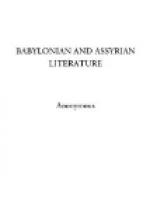return).
30 For the tearful supplication of my heart 65 times let the
name be invoked of every god.[4]
31 Peace afterward. 32 (Colophon) Like its old (copy) engraved and written. 33 Country of Assur-bani-pal King of multitudes, King of
Assyria.
[Footnote 1: Or more literally, “hiding.” The verb that follows means “to lift self up so as to face another.”]
[Footnote 2: In the Assyrian “quiet.”]
[Footnote 3: A rubrical direction.]
[Footnote 4: A rubrical direction.]
THE BLACK OBELISK INSCRIPTION OF SHALMANESER II
TRANSLATED BY REV. A.H. SAYCE, M.A.
This inscription is engraved on an obelisk of black marble, five feet in height, found by Mr. Layard in the centre of the Mound at Nimroud, and now in the British Museum. Each of its four sides is divided into five compartments of sculpture representing the tribute brought to the Assyrian King by vassal princes, Jehu of Israel being among the number. Shalmaneser, whose annals and conquests are recorded upon it, was the son of Assur-natsir-pal, and died in 823 B.C., after a reign of thirty-five years. A translation of the inscription was one of the first achievements of Assyrian decipherment, and was made by Sir. H. Rawlinson; and Dr. Hincks shortly afterward (in 1851) succeeded in reading the name of Jehu in it. M. Oppert translated the inscription in his “Histoire des Empires de Chaldee et d’Assyrie,” and M. Menant has given another rendering of it in his “Annales des Rois d’Assyrie” (1874). A copy of the text will be found in Layard’s “Inscriptions in the Cuneiform Character” (1851).
BLACK OBELISK OF SHALMANESER
FACE A
1 Assur, the great Lord, the King of all 2
the great gods; Anu, King of the spirits of heaven
3 and the spirits of earth, the god, Lord of the
world; Bel, 4 the Supreme, Father of the gods,
the Creator; 5 Hea, King of the deep, determiner
of destinies, 6 the King of crowns, drinking in
brilliance; 7 Rimmon, the crowned hero,
Lord of canals;[1] the Sun-god 8 the Judge of heaven
and earth, the urger on of all; 9 (Merodach), Prince
of the gods, Lord of battles; Adar,
the terrible,
10 (Lord) of the spirits of heaven and the spirits
of earth,
the exceeding strong
god; Nergal,
11 the powerful (god), King of the battle; Nebo,
the bearer
of the high sceptre,
12 the god, the Father above; Beltis, the wife of
Bel, mother
of the (great) gods;
13 Istar, sovereign of heaven and earth, who the
face of heroism
perfectest;
14 the great (gods), determining destinies, making
great my
kingdom.
15 (I am) Shalmaneser, King of multitudes of men,
prince
(and) hero of Assur,




